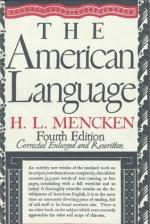
|
| Name: _________________________ | Period: ___________________ |
This test consists of 15 multiple choice questions and 5 short answer questions.
Multiple Choice Questions
1. What sort of distinction frequently occurs between an adverb and its primary adjective?
(a) Numerical.
(b) Syntactical.
(c) Pronunciation.
(d) Lexical.
2. Into what was the French surname "Beauchamp" translated in America?
(a) Gardner.
(b) Taylor.
(c) Fairfield.
(d) Smith.
3. Which adjectival prefix does Mencken state is confined to the more sophisticated classes?
(a) Pen-.
(b) Ante-.
(c) Ultra-.
(d) Super-.
4. Mencken reports hearing of a German named "Knoche," who to avoid being called "Nokky," changed his name to what?
(a) Knowles.
(b) Knox.
(c) Nock.
(d) Nixon.
5. Which Americanized foreign loan-word in the common speech means, in its vulgar loaned form, "to prance or to walk consciously"?
(a) Minoot.
(b) Habichoo.
(c) Sashay.
(d) Proteege.
6. From which of the following have the English changed their spelling?
(a) Gramme.
(b) Programme.
(c) Develope.
(d) Kilogramme.
7. Which country does Mencken state has a fondness for using surnames as given names?
(a) Canada.
(b) America.
(c) England.
(d) Mexico.
8. In what year did the National Education Association withdraw from the campaign for simplified spelling?
(a) 1899.
(b) 1921.
(c) 1907.
(d) 1914.
9. What is the name of the professor who advocates the assimilation and alteration of the spelling and accentuation of foreign words?
(a) Brander Matthews.
(b) Louise Pound.
(c) Nora Helmar.
(d) Edmund Gosse.
10. Which of the following is not one of the minor differences Mencken lists in Chapter 8.7?
(a) Specialty.
(b) Alarm.
(c) Aluminum.
(d) Fruit.
11. What language did "ambassador," "ancestor," and "bachelor" come into English from?
(a) Spanish.
(b) French.
(c) Latin.
(d) Italian.
12. Which of the following does names, used for a settlement, Mencken not list as bespattering the land?
(a) Madison.
(b) Jefferson.
(c) Washington.
(d) Lafayette.
13. What purpose does the double negative primarily serve?
(a) Syntactical compactness.
(b) Rhetorical circuitry.
(c) Confusion.
(d) Reinforcement.
14. Which of the following is often used in England to designate a thoroughfare?
(a) Lane.
(b) Drive.
(c) Boulevard.
(d) Avenue.
15. To what does Mencken ascribe the inflection of English adjectives?
(a) Comparison.
(b) Emphasis.
(c) Convention.
(d) Frivolity.
Short Answer Questions
1. According to Mencken, Italians often take the names of what nationality when they marry?
2. As what part of speech does vulgar American consider the word "self" within the spirit of the language?
3. According to Dr. Louise Pound, what do Latin plurals tend to become in colloquial American?
4. Which of the following is one of the three great causes of change in language according to Sayce, as reported in Chapter 9.3?
5. In what parts of language does Mencken say the "chief grammatical peculiarities" of spoken English are found?
|
This section contains 395 words (approx. 2 pages at 300 words per page) |

|




